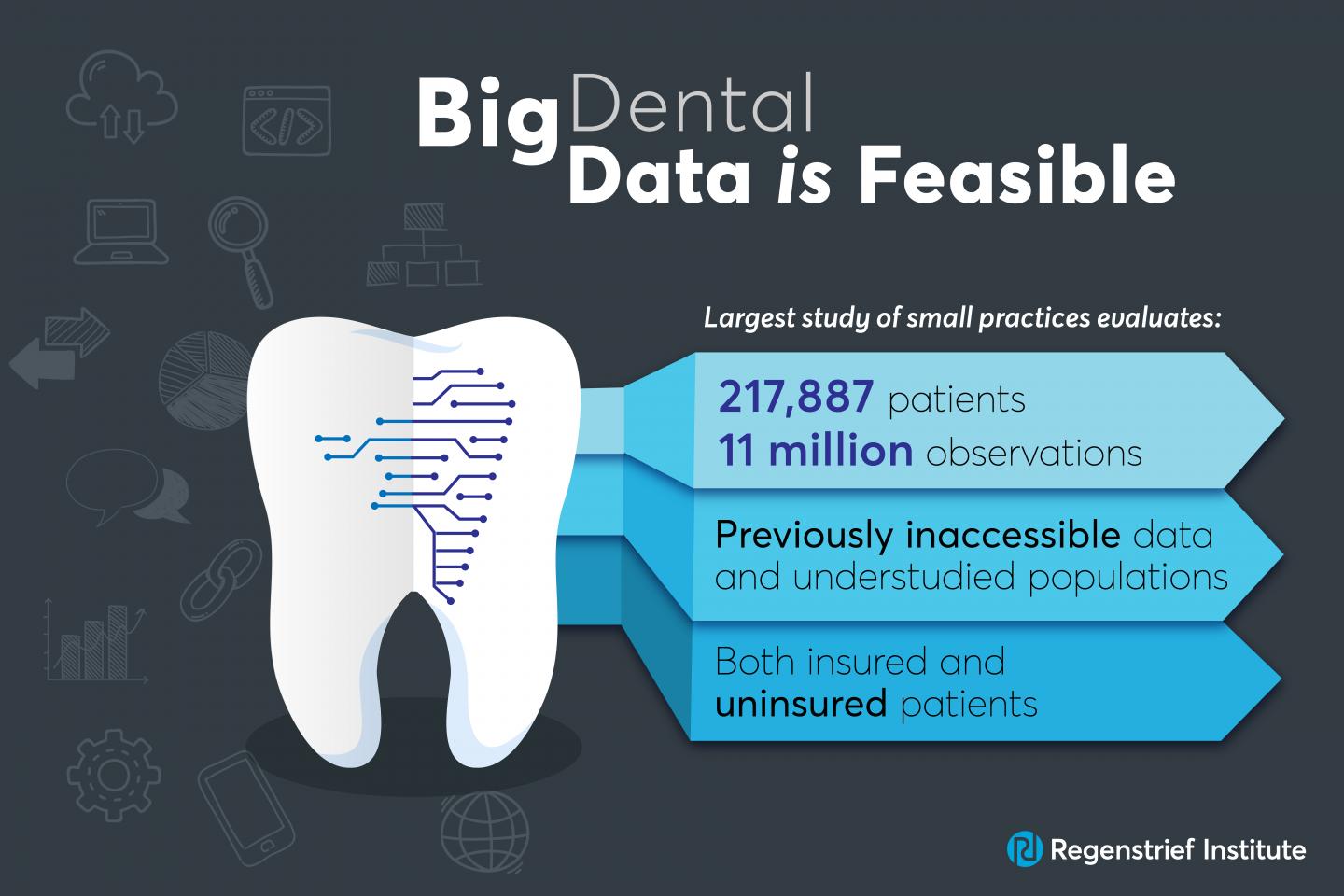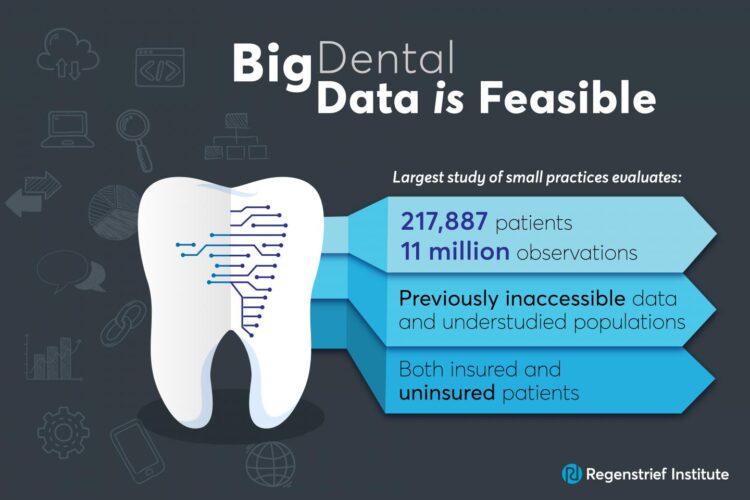Data is from solo and small practice dentists where most Americans receive dental care

Credit: Regenstrief Institute
INDIANAPOLIS – The largest study to date of electronic dental records delves into both previously inaccessible data and data from understudied populations with the ultimate goal of improving oral treatment outcomes. The work presents a learning health system – a mechanism for dentists to learn from their own experience and the experiences of fellow practitioners.
Researchers led by Regenstrief Institute Research Scientist Thankam Thyvalikakath, DMD, PhD, associate professor and director of the Dental Informatics Core at Indiana University School of Dentistry, evaluated de-identified data from the electronic dental records (EDRs) of 217,887 patients of 99 solo or small dental practices across the United States. These EDRs contained more than 11 million observations, with observation periods as long as 37 years.
The study determined that it is feasible to mine and utilize enormous amounts of EDR data to learn which dental therapies work and which do not, empowering quality improvement by individual dentists. EDR data is sufficiently reliable for purposes beyond the clinical care of individual patients.
Learning from aggregating data across practices gives each dental practitioner the opportunity to acquire knowledge not only from his or her own patient data but also the opportunity to compare their practice with their peers. Information obtained during each patient’s visit thus contributes to improved care for all, creating a true learning health system.
Now that the they have completed the proof of concept; the researchers will use the data to evaluate of the long-term effectiveness of two common dental procedures performed on permanent teeth — root canal therapy and tooth-colored fillings in rear teeth. Data analysis for that portion of the study, which will determine how well and how long root canal treated teeth and back teeth filled with tooth-colored fillings continue to function, will help both dentists and the patients make evidence-based care decisions. Data analysis is currently nearing completion and the findings will be published in the future.
“Here in the real world of the dentist’s office we are seeing patients with all kinds of real-world conditions – pain, underlying medical conditions, lack of adequate past oral health care — so this large data set provides a unique insight into the treatments offered in the type of dental offices where most Americans receive care,” said Dr. Thyvalikakath, the founding director of Regenstrief-IU School of Dentistry dental informatics program.
Information on demographics, reason for visit, medical and dental history, social history, tooth characteristics and treatment, as well as practice and practitioner characteristics was collected for each patient visit.
Dr. Thyvalikakath describes the work as groundbreaking in four areas:
- 1. Dentists were able to share their data for research in an anonymized process with their EDR vendors’ help, because a typical solo dentist or even small practice does not have dedicated IT staff.
2. Data from two electronic dental record systems with varying formats and operating systems were combined. Interoperability has proved difficult with data from electronic medical record systems.
3. It is the largest study to evaluate data quality in a regular patient setting.
4. It looked at the oral health and treatment options of both insured and uninsured patients. Past studies have relied on insurance records and thus have provided no information on uninsured patients.
“Findings derived from patient data in real-world conditions is typically less difficult for clinicians to translate at the point of care than studies performed in large health systems which often represent a patient population that does not mirror the community dentists see in their practices,” said Dr. Thyvalikakath. “We are presenting a mechanism for dentists, many of whom practice by themselves or with only one or two others, to learn from their own experience and from the experiences of their peers to assist in improving skills and facing problems.”
###
“Leveraging Electronic Dental Record Data for Clinical Research in the National Dental PBRN Practices” is published in the peer-reviewed journal, Applied Clinical Informatics. Authors of the study, in addition to Dr. Thyvalikakath, who is the corresponding author, are Regenstrief Institute and IU School of Medicine Research Scientist Titus Schleyer; William D. Duncan of Lawrence Berkeley National Laboratory; Zasim Siddiqui, Michelle LaPradd and George Eckert of Indiana University; Donald Brad Rindal, Mark Jurkovich and Tracy Shea of Health Partners Institute; Gregg H. Gilbert of University of Alabama and the National Dental Practice-Based Research Network Collaborative Group.
The study was supported by a three-year $1.2 million grant from the National Institutes of Health’s National Institute of Dental and Craniofacial Research’s National Dental Practice-Based Research Network.
About Regenstrief Institute
Founded in 1969 in Indianapolis, the Regenstrief Institute is a local, national and global leader dedicated to a world where better information empowers people to end disease and realize true health. The Regenstrief Institute, a key research partner to Indiana University, and its researchers are responsible for a growing number of major healthcare innovations and studies. Examples range from the development of global health information technology standards that enable the use and interoperability of electronic health records to improving patient-physician communications, to creating models of care that inform practice and improve the lives of patients around the globe.
Regenstrief Institute is celebrating 50 years of healthcare innovation. Sam Regenstrief, a successful entrepreneur from Connersville, Indiana, founded the institute with the goal of making healthcare more efficient and accessible for everyone. His vision continues to guide the institute’s research mission.
About Indiana University School of Dentistry
The only dental school in the Hoosier state, Indiana University School of Dentistry (IUSD) offers an extraordinary learning environment in which teaching, research and community service come together in the best way possible for the preparation of tomorrow’s dental professionals. About 80 percent of the dentists practicing in the state of Indiana are alumni of the school.
Founded in 1879 in Indianapolis, IUSD is located on the health sciences campus of IUPUI, one of the outstanding urban universities in the United States with a recognized commitment to community engagement. IUSD capitalizes on the campus’s central location in the state and its position in the research corridor that links IUPUI, Purdue University West Lafayette, and Indiana University Bloomington. IUSD faculty conduct world-class interdisciplinary research in collaboration with the other IU health science schools and the Purdue Schools of Engineering and Technology and Science.
Regenstrief-IU School of Dentistry program in dental informatics
Established in 2019 with the goal of improving oral health for better overall physical and emotional health, the Regenstrief-IUSD program in dental informatics is among the first dental informatics programs in the country and is thought to be the only program linked to a clinical data repository managed by a regional health information exchange.
About Thankam Thyvalikakath, DMD, PhD
In addition to her roles as a Regenstrief Institute research scientist and founding director of the Regenstrief-IU School of Dentistry program in dental informatics, Dr. Thyvalikakath is the director of the Dental Informatics Core, an associate professor at IU School of Dentistry and an adjunct associate professor in the IUPUI School of Informatics and Computing.
Media Contact
Cindy Fox Aisen
[email protected]





